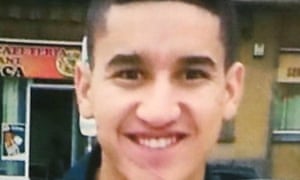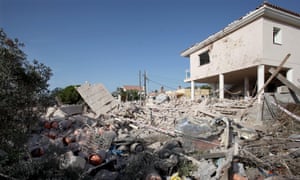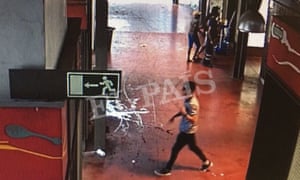
Four suspects arrested in connection with last week’s terror attacks in Spain will appear in court on Tuesday.
The last known member of the Barcelona terror cell was shot dead on Monday after he was cornered by armed police while wearing a fake suicide vest, and police have said they now believe they had apprehended all members of the cell.
“We were looking for 12 people and they are now all either dead or in custody,” said the police chief, Josep Lluís Trapero.
Younes Abouyaaqoub was killed in a town 30 miles west of Barcelona, four days after he drove a van along the crowded tourist boulevard Las Ramblas, killing 13 people and injuring more than 130.
Police said Abouyaaqoub shouted “Allahu Akbar” (God is greatest) just before he was gunned down outside Subirats, shortly after local people called police to say they believed they had spotted him.
Uncertain whether the vest he was wearing contained a real bomb or not, police deployed a robot to remove and examine the device, before confirming that it was fake.
Five other members of the cell – including Abouyaaqoub’s brother Houssaine – were shot dead by police in the coastal town of Cambrils early last Friday. They too were wearing fake suicide vests.
The four men detained – Driss Oukabir, Sahal el Karib, Mohammed Aalla and Mohamed Houli Chemlal – will face a judge for the first time on Tuesday at a special tribunal for terrorism. The judge will decide if they are to be charged.
An investigation into the cell’s possible international links will stay open, authorities said.
Meanwhile, up to 1,000 Muslims marched down Las Ramblas under the slogan “Muslims against terrorism.”
Younes Abouyaaqoub, 22, had fled Las Ramblas on foot and killed a 14th person, named by police as Pau Pérez, in order to take his car and escape from the city.
The owners of a vineyard outside Subirats said police had warned them to leave the property after they saw a car crossing their land at high speed. They then heard a helicopter overhead and a number of police cars racing to the area.
A local resident, Guillem Sánchez, told Catalan TV he then heard “as many as 20 shots” being fired.
Anti-terrorism detectives were attempting to establish whether the Barcelona cell had any links with the terrorists responsible for the Paris attacks of November 2015 and the bombings in Brussels four months later.
Police also raided more properties in Ripoll, the small town in northern Cataloniawhere almost all the suspected members of the cell had been living.
The investigation is focused on Abdelbaki Es Satty, a man in his 40s who had been an imam in Ripoll for the last two years. Es Satty died when an explosion ripped through the cell’s bomb factory, DNA from the scene in Alcanar has shown.
He was appointed as an imam in Ripoll despite having a conviction for drug smuggling. He had also fallen under suspicion during an investigation into attempts to recruit local youths to fight for Islamic State.
Es Satty spent several weeks in Vilvoorde, seven miles north of Brussels, between January and March last year, according to the Belgian town’s mayor, Hans Bonte.
Mimoun Aquichouh, the imam at the main mosque in the town, said Es Satty had visited a mosque in the nearby town of Diegem, looking for work, but became defensive when asked to provide a record of his criminal history. “He asked why it was necessary, why we did not trust him,” Aquichouh said. At that point the mosque alerted police and Es Satty was not seen again.
Es Satty had been arrested on a number of occasions, and had a conviction for attempting to smuggle 12kg of hashish into Spain from Ceuta, one of Spain’s enclaves on the north African coast.
More significantly, his name also appears in a report that was compiled after five men were arrested south of Barcelona, in Vilanova i la Geltrú, on charges of recruiting young men to fight in Iraq.
At least two people are thought to have died in the blast early on Thursday morning in the town of Alcanar, 145 miles (234km) south of Ripoll. Es Satty’s van was found parked a few miles outside the town on Monday.
Police have recovered more than 100 gas canisters from the rubble of the bomb factory, and said they have found traces of triacetone triperoxide, an explosive used in a number of terrorist attacks in recent years.
Officials say attempts were being made by the cell to construct either one large bomb or a number of smaller bombs to be packed into three vans they had rented using Abouyaaqoub’s credit card.
The explosion appears to have prompted members of the cell to instead launch a series of attacks using one of the vans in Barcelona and a blue Audi car in Cambrils, a coastal town south of Barcelona.
The Audi had been caught speeding on camera in Paris a week before the attacks, according to Le Parisien newspaper.
One woman died after being struck by the car in Cambrils, while 13 were killed by the van as it accelerated down Las Ramblas. One of the youngest to die was Julian Cadman, a seven-year-old dual British-Australian national. More than 130 people were injured.
CCTV images show that after the white Fiat van came to a halt halfway along Las Ramblas, Abouyaaqoub clambered out, donned sunglasses, and walked slowly through La Boqueria covered food market, making his way through crowds of tourists who had taken cover during the attack.
Police say he then walked for about 90 minutes, making his way to the Universitaria district in the north of the city. There he attacked and killed Pérez, 34, a Spanish vineyard worker who had just parked his Ford Focus car.
Abouyaaqoub drove away with Pérez’s body on the back seat of the car, forcing his way through a police checkpoint to escape from the city. He abandoned the car after coming under fire from police to the east of Barcelona and made off on foot. When police found Pérez they discovered he had died from a single stab wound to the chest.
Four of the terrorists killed at Cambrils were shot by a single police officer. Among them were Abouyaaqoub’s cousins Mohamed and Omar Hychami.
Abouyaaqoub, his brother and cousins were all of Moroccan origin. Relatives in M’rirt, 90 miles south-east of the Moroccan capital, Rabat, said they last saw him and Mohamed Hychami when they paid an unexpected visit in March.
Both men had become religiously conservative, and were refusing to shake the hands of female relatives, according to a female cousin interviewed by Reuters, who asked not to be identified.
One relative said Mohamed was the more conservative of the two cousins, but added that he had frequented nightclubs and drank alcohol before his behaviour changed about three years ago. “Up until last year, Younes was totally normal, but when he visited us earlier this year, he refused to shake our hands, just like Mohamed,” she said.




No comments:
Post a Comment